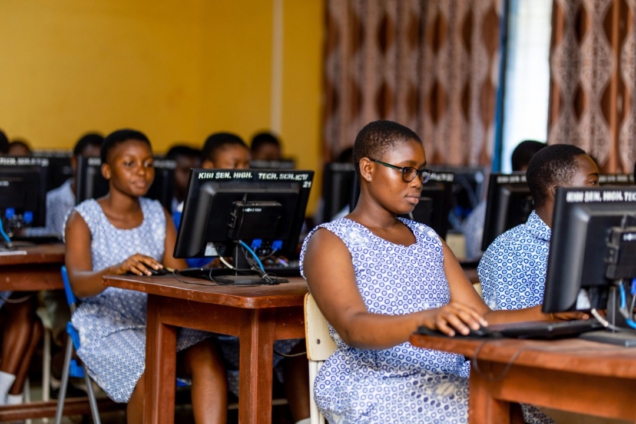In a powerful call to action, Dr Babs Omotowa, President of the Nigerian University of Technology and Management (NUTM), recently urged educational institutions across Africa to shift from tradition to transformation, specifically, to cultivate graduates who are not only tech‑savvy but also entrepreneurial leaders ready for a digitally driven future.
Table of Contents

A Vision Rooted in Purpose
Dr Omotowa made his remarks as part of a broader discourse on how higher education must evolve to serve society effectively. He emphasised that schools must actively produce tech‑driven leaders—graduates equipped with skills in artificial intelligence, robotics, software engineering and innovation, rather than relying on outdated rote methodologies.
Top of his agenda is moving away from mere theory-learning towards experiential, problem-based education—aligning campuses with real-world industry challenges and innovation ecosystems. In his words, every young Nigerian should graduate not just with knowledge, but with the capacity to transform communities using technology.
NUTM: A Case Study in Innovation
Since its inception in 2019, NUTM—based in Lagos and fully accredited by mid‑2023—has modelled what transformational tertiary education can look like. With degree programmes in computer science, cybersecurity, IT, software engineering, data science and business analytics, the university is driven by three pillars: management, technology, and entrepreneurship.
What sets NUTM apart is its close ties to industry, and a faculty drawn from global top-tier institutions such as MIT, Stanford and Oxford. This ensures students engage with world-class curricula and cutting-edge research methodologies from day one.
The university’s early recruitment success is reflected in its gender equity numbers—42% female enrolment in earlier classes, now growing to around 50%—and fully-funded scholarships for students from disadvantaged backgrounds, including survivors of kidnapping in North‑East Nigeria.
Bridging Academia and Industry: The Town‑Gown Imperative
Dr Omotowa reinforced that true innovation comes when universities and industries function in harmony. He urged deeper collaboration, where academic research addresses real societal needs, and industry helps shape academic priorities and outcomes.
He recounted delivering a keynote at Rivers State University, emphasising “Town‑Gown” synergy—where local universities and employers jointly tackle challenges like environmental remediation, digital infrastructure and entrepreneurship development.
His central point: Nigeria and Africa must pivot from an extractive, oil‑based economy to a knowledge-driven one, where innovation and entrepreneurship thrive. To do so, universities must be designed to foster critical thinking, creativity and real‑life problem solving.
EdTech, AI, and the Role of Schools
Dr Omotowa’s message aligns forcefully with global trends. Across the world, school systems are being asked to integrate new technologies—such as AI, data science, and generative tools—to support personalised learning and teacher productivity.
There is widespread agreement—industry leaders, educators, policymakers—that students must graduate with digital fluency. In fact, over 250 CEOs, including leaders from Microsoft and other top tech firms, recently called for mandatory AI and computer science education in school curricula, highlighting early career income benefits and economic competitiveness.
Project-based models like IBM’s P‑TECH schools and incubators across Africa further validate Dr Omotowa’s mission: partner academic institutions with real-world challenges to teach innovation, mentorship, and entrepreneurial resilience.
The Nigerian Policy Context
Dr Omotowa’s remarks come amid Nigeria’s national push to develop its digital economy. Following the federal government’s 3MTT (“3 Million Technical Talent”) programme launched in late 2023, the country is working to train millions in fields such as AI, cybersecurity, cloud computing, and UX design by the end of 2027.
For universities like NUTM, this means aligning academic design with national skill demands—providing a pipeline of homegrown innovators who can help fill skills gaps and boost national competitiveness.
Building Future‑Ready Graduates
The kind of graduates Dr Omotowa envisions blend technical prowess with entrepreneurial drive and ethics. NUTM’s curriculum is designed around:
- Tech mastery: core STEM disciplines taught through real-world applications.
- Entrepreneurship: support for startups via on‑campus incubators, Accelerator programmes, and pitch/demo days.
- Leadership and ethics: instilling a sense of responsibility, particularly among students from challenged backgrounds.
The result: alumni who launch solutions for challenges in health, education, climate, and local economies. Dr Omotowa insists that schools everywhere adopt this integrated model to produce graduates for today’s—and tomorrow’s—workforce.

Challenges and the Road Ahead
While the vision is clear, challenges remain. Tuition costs are relatively high at NUTM due to investment in global faculty and tech infrastructure, and the university relies on donor support and market‑based fees rather than government funding.
Dr Omotowa advocates reform within Nigeria’s broader tertiary sector: mobilising alumni networks, philanthropic foundations, scholarship funds, and student‑loan systems to uplift public universities to world‑class standards. He sees the goal as both reducing brain drain and opening access to quality education domestically.
The key hurdle, he says, is cultural—moving from rote memorisation and passive learning to hands‑on project work, design thinking, and innovation.
Why It Matters: Africa’s Leadership Moment
Africa remains the youngest continent globally, with projections estimating it will account for ~40% of the global youth population by 2050. If harnessed well, this demographic advantage could make African nations major players in the global digital economy. Dr Omotowa’s vision calls on schools to rise to this historic opportunity.
By shifting educational missions from credentialing to capability, institutions can empower students to invent, lead, and build thriving industries—right here at home.

Conclusion
Dr Babs Omotowa’s charge is clear: schools must now see themselves as incubators of tech‑driven leadership, not just exam centres. Combining strong STEM curricula, entrepreneurship training, industry integration, and ethical leadership, educational institutions can equip students for meaningful impact, not just jobs.
If universities across Nigeria and Africa adopt this mission of producing graduates who can solve problems, launch startups, and innovate socially, they will fulfil their role in nation‑building and global competition in the 21st century.
Join Our Social Media Channels:
WhatsApp: NaijaEyes
Facebook: NaijaEyes
Twitter: NaijaEyes
Instagram: NaijaEyes
TikTok: NaijaEyes







































